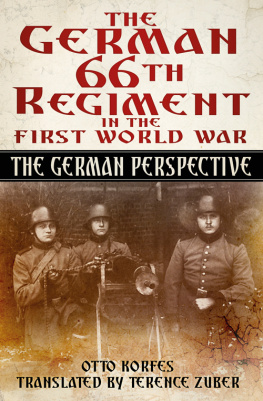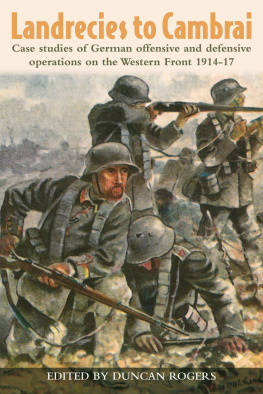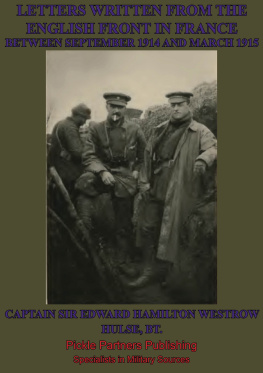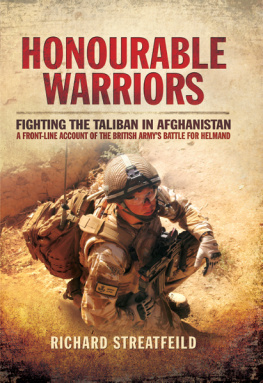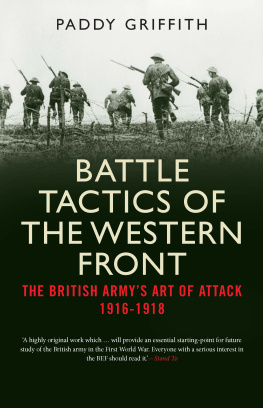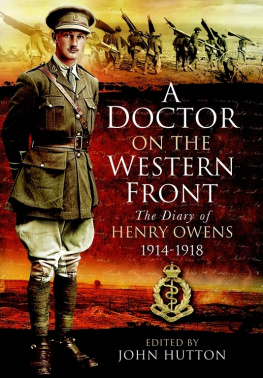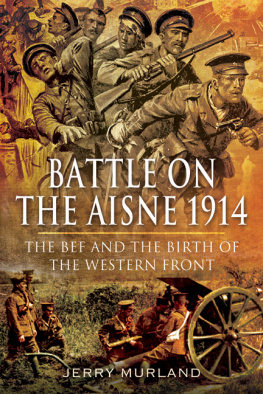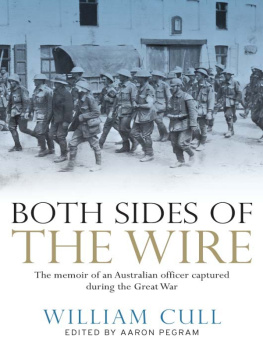First published in 1993 by
LEO COOPER
190 Shaftesbury Avenue, London WC2H 8JL
an imprint of
Pen & Sword Books Ltd
47 Church Street, Barnsley, South Yorkshire S70 2AS
Text and illustrations copyright the Estate of the Late Henry Ogle, 1993
Preface, notes and selection copyright the Estate of the Late Michael Glover, 1993
A CIP catalogue record for the book is
available from the British Library
ISBN 0 85052 560 8
Typeset by Yorkshire Web, Barnsley, South Yorkshire
Printed by
Redwood Press
Melksham, Wiltshire
the fateful battle line
That loops the ghost of Ypres, a name
By sacrifice of youth immortal made.
Very Lights, Henry Ogle, 1915
Light Music of the Battle Line:
In 1915 the barbed wire was often hung about with empty tins which it was hoped would act as alarm bells, but they were a nuisance, giving false alarms in a breeze or when a rat climbed to investigate. The Germans actually did tie little iron bells to their wire. I still have one as a souvenir of a danger-spot in Pacaut Wood in 1918, and it has since tinkled more merrily in childrens games than ever it did for the Germans.
The sentry whose spell of duty coincided with the beginning of rain would hear innumerable little tinny but musical runs Drip, drip, drip, Drop, drop, drop, Drip, drip Drop as the water discharged from barbed-wire points which happened to be above empty tins. Some filled faster than others, and a gamesome sentry could observe carefully, then back the tin of his choice against all others to fill first, cursing the interfering gust of wind that wasted his precious drips and drops.
A man with an ear for music could find much to interest him in these otherwise doleful surroundings the quality, timbre or sonority of the drops went through the proper ascending scale until the tin was full, to continue on a flatter and less colourful note, unless the tin overbalanced and provided a cascading sound for variety. With scores of tins within earshot, in varying positions, shapes and sizes, the resulting miniature symphony may be imagined. Gusts of wind provided variation in tempo. Above a certain strength the wind hummed and throbbed forlornly through the forest of wire like ghosts of a thousand little harps, giving a gentle, sad accompaniment, rising even to play a brief and thrilling major part, then dying away to let the tins take up the watery theme.
It seems a pity that these sounds should have gone almost without appreciation or even interest; sooner or later, though, they had to be noticed. Then an unappreciative and, finally exasperated sentry would hurl a clod of clay at a tin with Take THAT! and stop your bloody tap, you blasted everlasting, drip dropping, sodding bastard! But whats a clod of clay on maybe forty miles of dripping British front! With comic disregard both of human feeling and its lack, the symphony would go on.
Water Music, Henry Ogle
War in its nature is a dangerous and uncomfortable business, and in Britain it has become accepted truth that the fighting on the Western Front between 1914 and 1918 was the supreme example of its unpleasantness. Other nations have other standards by which to judge the nadir of military loathesomeness; the French and the Germans may well feel that even the agony of Verdun did not measure up to the miseries their armies suffered in Russia in 1812 and 1944 respectively, while it is the hell of Gallipoli rather than the ANZAC experience in France and Flanders that is lodged in the national consciousness of Australia and New Zealand. It is impossible to compare the unpleasantness of battles fought in differing climates at different timesand, save that they were conducted on a very much larger scale, who can say that for those engaged the Somme in 1916 or Ypres in the following year were more hideous than Keren, Cassino or Kohima?
Henry Ogles narrative does not play down the horrors of the Western Front but it goes far to correct the picture of unrelieved ghastliness that so often emerges from accounts of the fighting there. There were quiet sectors and, even at the worst of times, lighter moments. There was comradeship to help in making the unendurable endurable. For two years he served on the Continent in the ranks, and for the last ten months of the war he was a successful officer until his second wound saved him from taking part in the final advance to victory. He recorded his experience with keen insight, an eye for detail, and a serviceable sense of humour. The outstanding feature is the complete lack of bitterness at the loss of four years of his life and the death or maiming of so many of his friends and comrades. Certainly there is no hatred of the German enemy, whom he admired as highly professional fighting men; neither does he indulge in the corrosive bitterness against his senior commanders, as is the fashion in so many memoirs of the time. Like any soldier he complains, but his butts are those who contrived to keep clear of the fighting, especially the Base Wallahs who, to an even greater extent than in the war of 193945, made life hideous for those who were forced to spend time in depots and transit camps. Almost as bad were the junior staff officers, not so much because they were incompetent, which was not their own fault, but because, by their attitude and particularly by their dress, they distanced themselves from those who had to do the dirty work of fighting. This is a grouse to be found in all memoirs of the 191418 war, except those written by staff officers, and seems to have been abundantly justified. It is to the Armys credit that in the Second German War the gulf between regimental soldiers and the staff was never allowed to develop.
When war broke out in August 1914 Henry Ogle was twenty-five. He had been born in New South Wales, where his father, a compositor and first-generation immigrant, had established a printing business near Sydney. Traumatically, he collapsed and died in front of Henry, who was then aged four. Two years later Henrys mother sent him back to England in a sailing ship to be adopted by his uncle, another Henry Ogle, Congregational Minister of Pickup Bank, Hoddlesden, near Darwen in Lancashire. Uncle Henry had married the daughter of a Sunderland shipyard owner, Alice Mills, but she seems not to have brought money into the marriage since a place was found for young Henry at a school for the sons of impoverished clergySilcoats School, Wakefieldwhere he stayed until the school was destroyed by fire in 1904. By this time he had a love of books, natural history and, above all, painting, in all of which he was supported by his adoptive parents. He completed his schooling at a less congenial establishment, and in 1909 went for teacher training at Chester College, moving on from there to Leamington Spa College of Art where he met and fell in love with a fellow student, Muriel Annie Harper, who lived near Stratford-upon-Avon. It was probably because of her that when the time came to find a job as a teacher of art he took a post in Warwickshire, at Redditch; this was just five months before war came.
The army which Ogle joined in September 1914 was an amateur affair. Britain was having to pay, and for some years continued to have to pay, for her refusal to introduce conscription in peacetime and for her belief, refuted over the centuries, that an army could be improvised when it was needed. While Germany could immediately field 4.3 million trained soldiers and France 3.5 million, the British Army and its immediate reserves amounted to less than half a million, of whom nearly a third were scattered across the world, in India and in colonial garrisons. The reinforcement most nearly available were about a quarter of a million men in the Territorial Force who, if undertrained and under-equipped, were at least organised into units and formations. It had been intended to expand the Regular Army on the basis of the TF but, when the need came, it was decided to rustle up a whole new army of seventy divisions regardless of the fact that there were no arms or equipment to be enlisted, few trained officers or NCOs to train the men, no commanders and no staff officers to administer them. Arms and equipment could, in time, be manufactured, but there was no way of creating generals and staff officers, the more so since the Staff College was closed for the duration, instructors and pupils being sent to posts in the existing divisions, only two of which had more than a skeleton staff before mobilisation. To provide commanders for all the new divisions, to say nothing of those for the corps and armies into which they were grouped, could only be done by scraping the barrel. One New Army division went into action commanded by a man who had retired from the Regulars as a major in 1905. The wonder is not that the British Expeditionary Force did not achieve more in the early years of the war but that it managed to survive at all.



